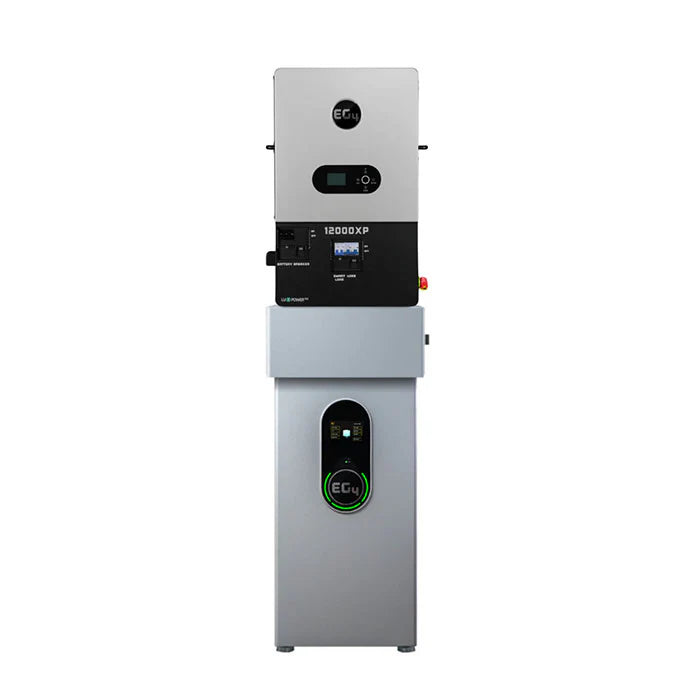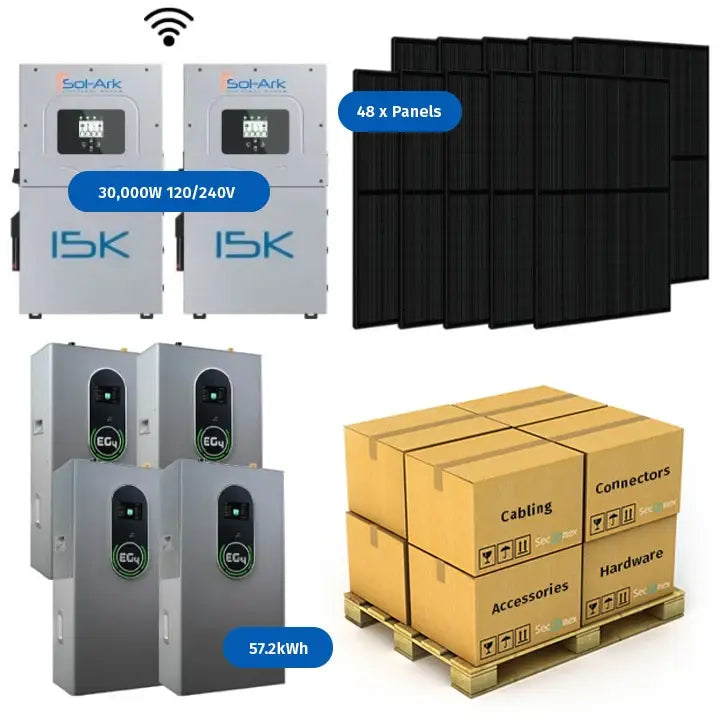Shop Off-Grid Solar Systems: Complete Power Solutions
Achieve true energy independence with our off-grid solar systems, designed for cabins, homes, and remote sites. For advanced battery options, see our Lithium Iron Phosphate Batteries range.
Each off-grid solar power system includes high-efficiency solar panels, inverters, and battery banks for reliable power day and night. For mounting flexibility, explore Solar Roof Mounts to optimize your solar array’s performance.
Our off-grid solar kits are engineered for easy installation and long-term durability, supporting everything from tiny homes to large cabins. For charge management, review MPPT Charge Controllers to maximize battery storage and system efficiency.
Key Capabilities
-
Complete Off-Grid Power: Each system integrates solar panels, an inverter, and a battery bank for seamless off-grid living.
-
Flexible Sizing: Kits available from 3.2kW to 19.2kW to match your daily energy usage and power demand.
-
Advanced Battery Technology: Options include lithium, lithium-iron phosphate, and lead-acid batteries for optimal storage and backup power.
-
High-Efficiency Solar Panels: Mono solar panels and bifacial options deliver energy even in low-peak-sun hours.
Ideal For
-
Cabins, tiny homes, and remote properties seeking reliable off-grid power.
-
Home backup and emergency energy solutions where the electricity grid is unavailable.
-
RVs and mobile setups requiring a portable off-grid solar kit.
-
Users wanting to go off-grid for energy independence and eco-friendly solar solutions.
-
Standalone systems for off-grid living, farms, or backup power supply.
Other Relevant Collections
Quick Spec Comparison Table
|
Product Name |
System Size |
Battery Bank (kWh) |
Inverter (Watt) |
Solar Panels (Qty/Type) |
Stand-Out Features |
|
3.24kW EG4 Off-Grid Solar Power System |
3.24kW |
10.24 (Lithium) |
6,000 |
8 x 405W Bifacial |
Complete off-grid solar kit, AC power, easy install |
|
8.1kW Complete Off-Grid Solar Power System |
8.1kW |
14.3 (Lithium) |
12,000 |
20 x 405W Mono |
High-efficiency solar panels, scalable |
|
9.72kW Complete Off-Grid Solar Power System |
9.72kW |
28.6 (Lithium) |
12,000 |
24 x 405W Mono |
Large battery bank, backup power |
|
19.2kW Off-Grid Solar Power System |
19.2kW |
57.2 (Lithium) |
30,000 |
~48 x 400W Mono |
For high power demand, off-grid setup |
|
8.1kW Complete Off-Grid Solar Power System (Mono) |
8.1kW |
14.3 (Lithium) |
12,000 |
20 x 405W Mono |
System sizing for daily energy needs |
Why Shop Off-Grid Systems at The Solar Store?
-
Expert system design: Decades of experience in off-grid solar solutions.
-
Wide selection: Kits for every application, from cabins to home backup.
-
Quality components: High-efficiency solar panels, advanced inverters, and the best battery options.
-
Dedicated support: Guidance on system sizing, installation, and energy solutions.
-
Eco-friendly solar solutions: Reduce reliance on the electricity grid and support renewable energy.


![3.24kW EG4 Off-Grid Solar Power System - 6,000W 120/240V Inverter [10.24kWh Lithium Battery Bank] + 8 x 405W Bifacial Solar Panels](http://thesolarstore.com/cdn/shop/files/IMG0_1.jpg?v=1741447055&width=640)
![8.1kW Complete Off-Grid Solar Power System - 12,000W 120/240V [14.3kWh Lithium Battery] + 20x 405W Mono Solar Panels](http://thesolarstore.com/cdn/shop/files/8.1kwOff-GridSolarSystem.jpg?v=1743233725&width=640)
![9.72 KW Complete Off-Grid Solar Power System - 12,000W 120/240V [28.6kWh Lithium Battery Bank] + 24 x 405W Mono Solar Panels](http://thesolarstore.com/cdn/shop/files/IMG1.webp?v=1743585047&width=640)

